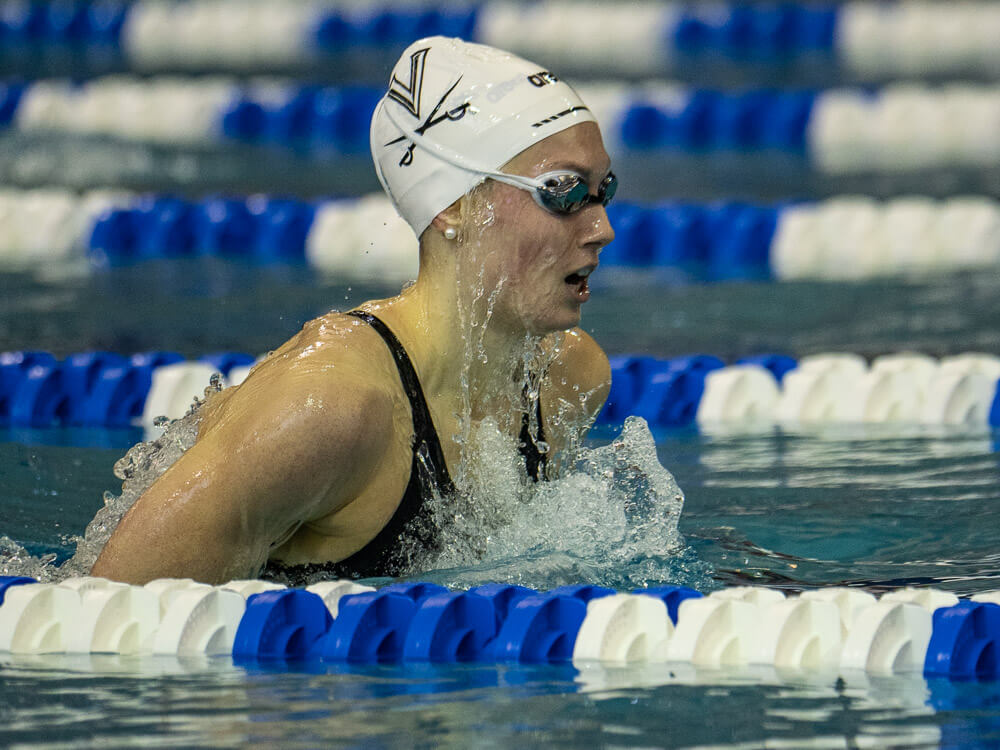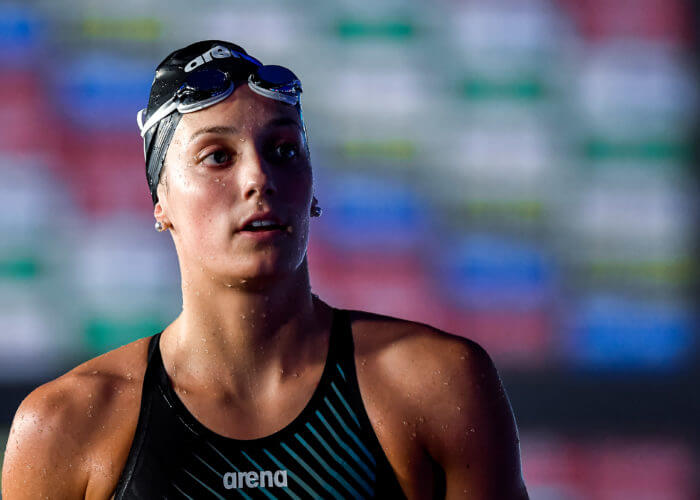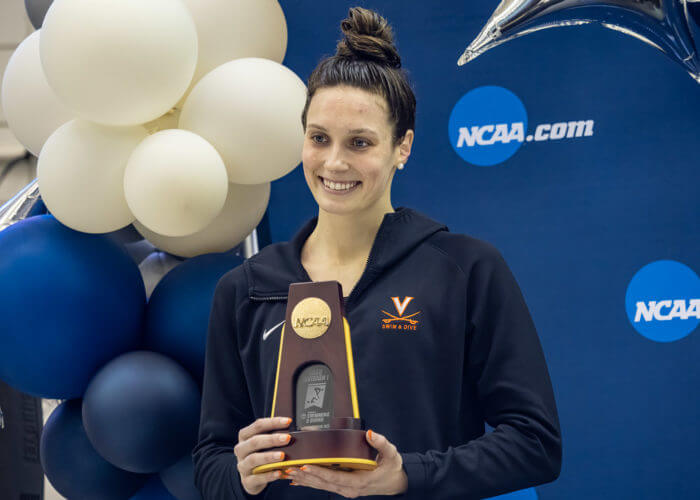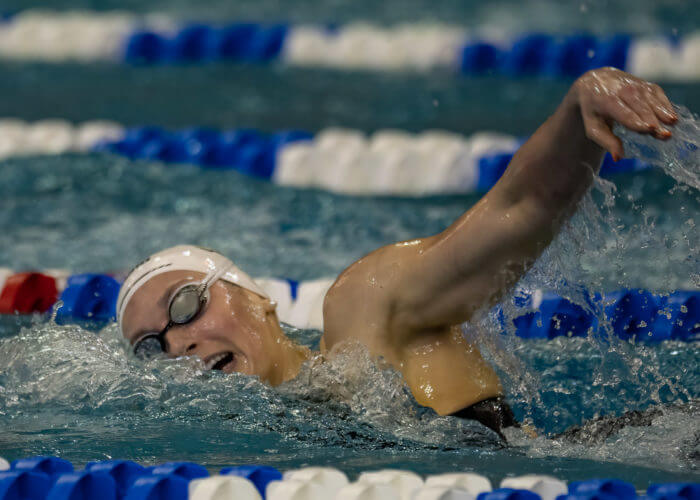Virginia’s Alex Walsh Has Emerged As a Superstar, With Greater Success Seemingly To Come

Virginia’s Alex Walsh Has Emerged As a Superstar, With Greater Success Seemingly To Come
As the University of Virginia women’s swimming team aims for its third straight NCAA crown, Alex Walsh individually and the Cavaliers collectively hope to keep advancing their definition of “the best ever.”
*******************
Alex Walsh brought home a silver medal from the Tokyo Olympics in 2021. Yet somehow, 2022 managed to displace that year as the best of her career.
As a sophomore at the University of Virginia, Walsh assembled an outstanding season on all fronts. She had what she described as “a perfect NCAAs,” winning six titles as the Cavaliers defended their national championship. She went from strength to strength—to a world championship in the 200 meter IM in Budapest…to six medals, including individual silver, at the 2022 Short Course World Championships in Melbourne.
The meets haven’t stopped, and neither has Walsh: “Even though it’s scary thinking about these big meets coming up this year, I do have this desire to be better than I was last year,” Walsh said. “I think I’m feeling very confident in knowing that I’m taking this extra step to outdo myself.”
TO TOKYO AND BEYOND
The range of emotions at the wall in Omaha on that Wednesday night at Olympic Trials was about as vast as the margin of victory was narrow.
At one extreme was Kate Douglass, grinning in shocked elation at the scoreboard’s results of the women’s 200 IM. On the other was Madisyn Cox, seemingly on the verge of tears, the emotion of the CHI Health Center subdued in deference to the 26-year-old’s plight.
In between those poles sat Walsh, drained beyond the point of reaction. She had just held on to make her first Olympic team—her first senior national-team event of any sort. She swam her ideal race, seizing the lead in breaststroke. As the field turned for home, Walsh looked surely ticketed for Tokyo. Douglass made it close, her charge in the final 15 meters passing Cox and nearly getting Walsh, who won in 2:09.30—.02 up on her Virginia teammate and .04 clear of Cox.
That swim set in motion a whirlwind 18 months, within which Walsh is still finding her footing. She won silver in Tokyo, behind home-nation hope Yui Ohashi’s IM double. Douglass was a step below her on the podium, the 19-year-old Cavaliers making history together.
Her success brought an inevitable post-Games reset, a process she couldn’t complete until safely ensconced back in Charlottesville. The structure and support system that college swimming supplied was integral to her process.

Photo Courtesy: Andrea Staccioli / Deepbluemedia / Insidefoto
“I feel really fortunate to be an NCAA athlete, especially coming back from the Olympics, because I think that really helped me get back into the excitement of it all,” Walsh said. “Having those short-term goals with NCAAs being in March, that was really motivating to get me back in the pool and keep working even though I had this super crazy summer. For me, it’s been all about taking baby steps toward Paris 2024.”
The “baby steps” are in her process. The results have seemed nothing less than monstrous leaps in 2022.
March: After winning the 200 IM, 200 freestyle and 200 breaststroke at the ACC Championships, Walsh wins the 200 IM, 400 IM and 200 butterfly at NCAAs. The IM is an NCAA and American record 1:50.08. She also wins three relay titles, including NCAA records in the 400 free and 400 medley relays, for the UVA powerhouse.
April: At International Team Trials, Walsh sets the U.S. Open long course reco rd in the 200 IM at 2:07.84, booking a trip to Worlds in Budapest.
June: Walsh is crowned world champion, dominating Kaylee McKeown of Australia in the final. She clocks a 2:07.13, making her the fifth-fastest 200 medley performer all-time. She’s the third-fastest swimmer in a textile suit ever, with only seven textile swims faster.
December: Walsh travels to Melbourne for Short Course Worlds, where she finishes second to Douglass in the 200 IM, her teammate picking up the SCM American record. Her versatility on display, Walsh adds three relay gold medals plus a silver and a bronze for a total six-medal haul.
“I pretty much had the best year of my swimming career ever,” she summarized. “I had a perfect NCAAs, became a world champion, went to Short Course Worlds. I don’t even know how it could get better than that. It was a peak.”
Walsh points to the training environment in Virginia as a vital ingredient in her success. She and Douglass have ranges of specialty, from the 200 strokes down to the 50 free, that are unheard of. Much of that is their undeniable natural ability. But it’s nurtured to reach its true potential by the unique environment that Coach Todd DeSorbo and his staff have created. Walsh, who trains primarily with the mid-distance group, sees the combined men’s and women’s team, with its bevy of training groups, as vital to keep all the weapons in her arsenal sharp.
“I think it’s the perfect scenario,” she said. “It’s like the world is your oyster—whatever you need is what is going to be offered and going to be available to you. It’s just easier with a combined program.”
A CONFLICTED SUMMER
Walsh spent the morning after she qualified for the Olympics sobbing in bed at her family’s Airbnb.
No matter how triumphant the previous night had been, there was no other emotion she could summon while sleeping in and watching the livestream of prelims of the women’s 100 freestyle that morning. Her sister, Gretchen, seeded just 34th, but hoping to make a big jump, hadn’t even made semifinals in what was likely her best chance to get to Tokyo, finishing a disappointing 28th.
Watching online, one of Team USA’s newest Olympians was beside herself.
“I’ve never been that emotional over a swim before,” Alex Walsh said. “I’ve had bad swims. I’ve seen bad swims. But it was just a different kind of hurt.”

Photo Courtesy: Peter H. Bick
Walsh’s emotions that week were conflicted, in a uniquely older-sibling kind of way. Separated by a year, Alex and Gretchen have achieved so much in lockstep—dominating in high school at Harpeth Hall in Nashville, Tenn., lifting a national title in Gretchen’s freshman year, starting a swimwear company, Sporti. If they were writing the script, reaching the Olympics together would’ve been the obvious next chapter.
But that’s not what Trials had in store. Alex quickly catches herself in calling it “not the worst-case scenario,” but even having that vocabulary at the ready is telling of a tumultuous time—for her and her family—split between emotional extremes.
The sisters had very different summers in 2021. For Alex, the atmosphere of the national team was crucial in helping her cope, perform and enjoy her shot at the sport’s pinnacle. She credits not just her UVA teammates on the squad, but longtime friends like Erica Sullivan, Regan Smith and Phoebe Bacon as people (who) “I was able to be vulnerable around and share obviously the disappointment, but also the excitement.” Gretchen’s process, as much as Alex can speak to it, was her own, one that Alex wasn’t involved in and accepts she probably wasn’t welcomed in.
The experiences left both sisters changed. But when they returned to Virginia, both oriented themselves in the new directions they needed. While the subject of 2024 hasn’t come up often—Alex was struck recently when Gretchen brought it up in casual conversation—the unspoken understanding is that both have a similar hunger to swim in Paris. Alex sees that in how hard her sister is working.
“Since being at Virginia, she has totally done a 180 in her mindset, her goals, how she’s training in practice,” Alex said. “It’s honestly been super inspiring to watch her dealing with that struggle and coming around and making the most of her college season, and now she has an undefeated college season. It’s been awesome to see her overcome this and have really big goals she is setting for herself.”
WHAT’S BETTER THAN THE BEST?
DeSorbo stresses to his swimmers that progress is measured by being better than the year before. Alex Walsh has certainly internalized that quest.
The Cavaliers’ two NCAA championships have brought unique psychological challenges. Summiting the mountain for the first time in 2021 was different, Walsh says, than the 2022 process of defending. Even if Virginia had practice of coping with the expectations of a favorite for NCAAs at the canceled 2020 meet (Walsh was still in high school then), they played up the underdog mentality a year later to secure their first banner.
To sustain what they’ve built, the fire has to come from within. The array of talented women in Charlottesville are used to generating that intensity.
“We know going into NCs, it’s going to be a battle,” Walsh said. “And every year that we stray further from that first national championship, it’s going to be harder to defend that. And we know that. But we’re also excited.”

Photo Courtesy: Peter H. Bick
That challenge plays into what Walsh sees as one of her strengths. She’s a computer science major, a rigorous line of study that presents quite the schedule challenge for a varsity athlete. Walsh fell into it in high school, with a class in software development that piqued her interest and that she found a facility with. She’s not quite sure what direction she’ll pursue professionally—she admits she’s not the most proficient coder, and her swim schedule doesn’t permit experimenting in different languages and projects like some of her classmates—but her business experience and outgoing personality open doors to communicate aspects of the technology in a uniquely valuable way. She sees her ability to think through problems, more than any specific coding language, as her primary strength.
Consider her work at Virginia this year, then, as a desire to optimize the talent that she and her fellow Cavaliers bring. One aspect that Walsh has added to the mix is her leadership, as a junior who knows the ropes. She’s learned from the national team how to do that, in short order going from a rookie to a seasoned veteran. (Even as a 19-year-old rookie, she was surprised to find herself near the median age of that uncharacteristically youthful Tokyo delegation.)
At Virginia, that means understanding the pulse of the team. So many of the Cavaliers’ standouts are somewhere along the spectrum Walsh has traversed in the last three years. They’re facing similar expectations and fears. They’re balancing individual aspirations against team duties and out-of-the-pool obligations. They’ve had their moments of doubt about whether they can continue to top their own performances, and they’ve fallen into periodic ruts where pressure seems overwhelming.
Walsh has been there. And she’s ready not so much to steer them through it, but to give teammates the tools—primarily a historical “We’ve-been-here-before” context—to get through it.
“Especially now that I’m a junior, I’m one of the older girls on the team and definitely feel more of a responsibility for keeping the team unified, motivated, humble,” she said. “I feel like I have this duty to the younger girls, to the older girls who did the same for me, and I’ve been trying to carry that over with the national team.”
Alex Walsh has seen how quickly the switch can flip. In the doldrums of a season, all it can take is a reminder of the overarching goal—a glance at the NCAA banners, a reminiscence of what last year was like—and it’s enough to get everyone refocused.
“When we remind ourselves how exciting it is to do it together as a team, that just makes me giddy,” Walsh said. “I get excited about it.”



